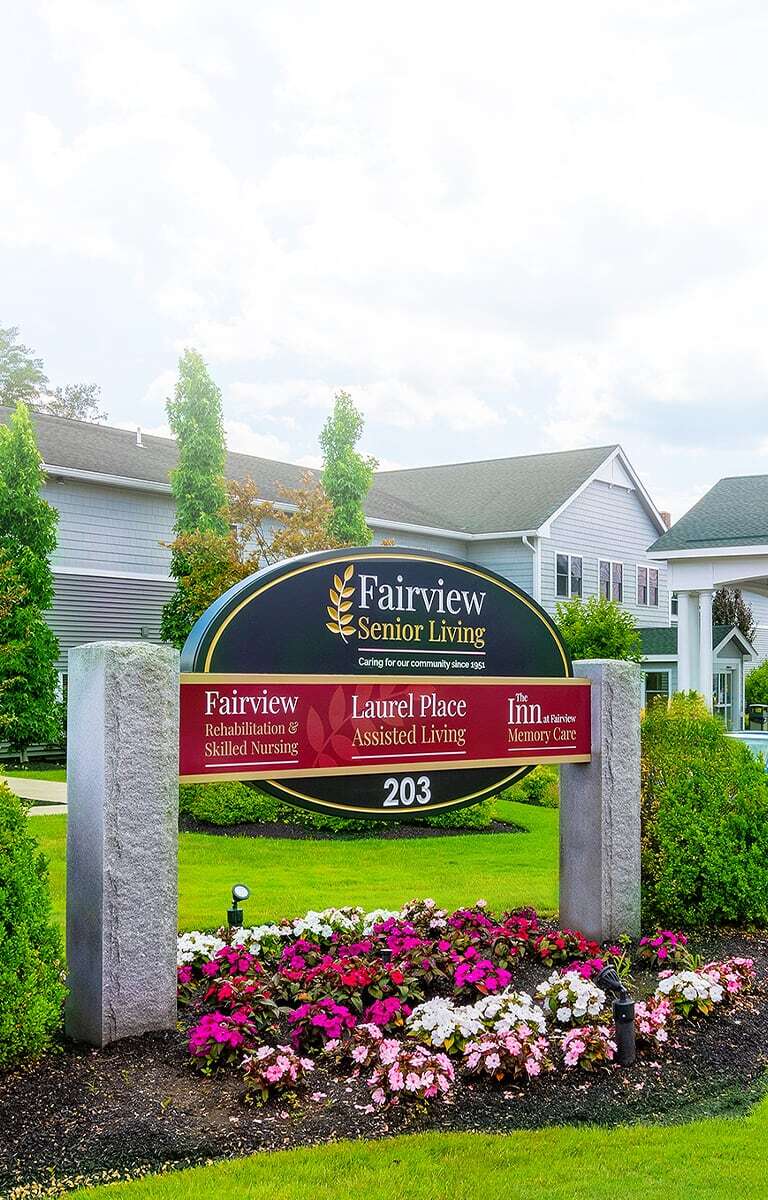When the time comes to consider a change in living arrangements for yourself or your loved one, it can be both scary and confusing. There is so much to think about, and navigating senior living options can feel overwhelming. Sylvie Cotnoir, Executive Director at Laurel Place Assisted Living in Hudson, New Hampshire shares some ideas for where to start when you begin the process of considering if an assisted living community is the right next step.
Cotnoir points out that it’s important to first get a basic understanding of what the differences are in the most common types of senior living options: independent living, assisted living, memory care, and skilled nursing. Cotnoir shares, “often, these options are available in a campus-style setting which offers a continuum of care for the resident. At Fairview Senior Living, a resident can transition from one level of care to the other as their needs change, without leaving the property.”
Independent living is for someone that is still active, social, and can live on their own. Independent living communities offer some lifestyle services and amenities such as communal dining, housekeeping, and maintenance, but do not offer personal care assistance or medical care.
Assisted living communities are an option for those who need a wide range of support services to help them with activities of daily living. They are designed for seniors who may need help with daily tasks, such as cooking and bathing. They may also need help in managing their medications and/or certain diagnoses such as diabetes. The level of care that can be provided will vary, depending on the state the community is located in. “In Massachusetts,” explains Cotnoir, “there are limited nursing services offered in assisted living communities as they are a more social model. However, if you cross the border to New Hampshire, Laurel Place at Fairview Senior Living offers a medical model, whereas nursing is able to provide for such things as medication administration, monitoring of vital signs and managing chronic conditions. Nursing care hours may also vary from place to place. Some only have part-time nursing staff, whereas Fairview has 24/7 nursing staff on-site.”
Seniors who live in newer or more updated assisted living communities, like Laurel Place at Fairview Senior Living, can expect a private suite-style apartment. It includes a bedroom/living area, a kitchenette, a bathroom, and an outdoor patio, as well as common areas for socializing. Alternatively, some assisted living communities have living spaces consisting of a private or semi-private sleeping area and a shared bathroom, and may resemble a dormitory or hotel.
Memory care is designed specifically for seniors with Alzheimer’s Disease or other forms of Dementia. It can be difficult to know when it may be time to move a loved one to a memory care community, because the disease can progress slowly over time. Alzheimer’s can take years to transition from early to mid and late stages, so even if your gut says it’s getting worse, your heart might argue otherwise. Add the emotions that can come with moving a loved one into a memory care community and the decision becomes even more difficult.
When considering memory care, the continuum of care model mentioned earlier can be a good option for families that have a loved one that may be experiencing memory issues but are exhibiting no safety concerns. Cotnoir explains that some seniors with memory issues may start by living in the assisted living community, and as memory issues progress, move to the memory care community for more support. This continuity is beneficial for the resident and provides peace of mind to the family.
Skilled nursing facilities, commonly referred to as nursing homes, are long-term care facilities that provide the highest level of care of all the long-term care options in the spectrum of senior living. They typically employ a Director of Nursing (DON), Registered Nurses (RNs)/Licensed Practical Nurses (LPNs), Licensed Nursing Assistants (LNAs) that work closely with physicians who make regular visits to the facility. Residents of skilled nursing facilities typically have high-level medical needs such as a chronic condition that requires consistent monitoring. They may also be recovering from a serious illness in the hospital or from an injury that requires rehabilitative care. Skilled nursing or assisted living care is often the next step, as staff can provide a similar level of continuous service. Candidates are typically assessed and found to require a certain predetermined level of care.
“When considering a move, it’s often hard to know when the time is right,” explains Cotnoir. She shares a few common clues that can help alert you to the idea that it may be time to consider a new living arrangement for you or your loved one:
- A recent fall or multiple falls
- A worsening health problem
- Difficulty taking medications as prescribed
- Inadequate personal hygiene such as not bathing, changing clothes, or brushing their teeth
- Problems completing activities of daily living such as cooking or doing laundry
- Rapid weight loss or gain, and/or poor eating patterns
- Mobility challenges such as climbing steps at home or getting out of a chair
- Inability managing housework such as doing dishes, cleaning the bathroom, or keeping up with the yard
- Isolation from others and little to no socialization
- Their caregiver showing signs of caregiver burnout
- Frequent hospital and/or emergency room visits
A senior living assessment tool can also help with decision making. In about five minutes or less, you can obtain a personalized report that can help you decide if it’s time to make a change, and if it is, which senior living options are best. “An online assessment helps seniors and their families make difficult decisions with clarity, so that they can take the next step more confidently,” explains Cotnoir.
If you think it’s time to consider senior living, try this free assessment by Roobrik that evaluates your unique situation and provides guidance that fits your needs.




